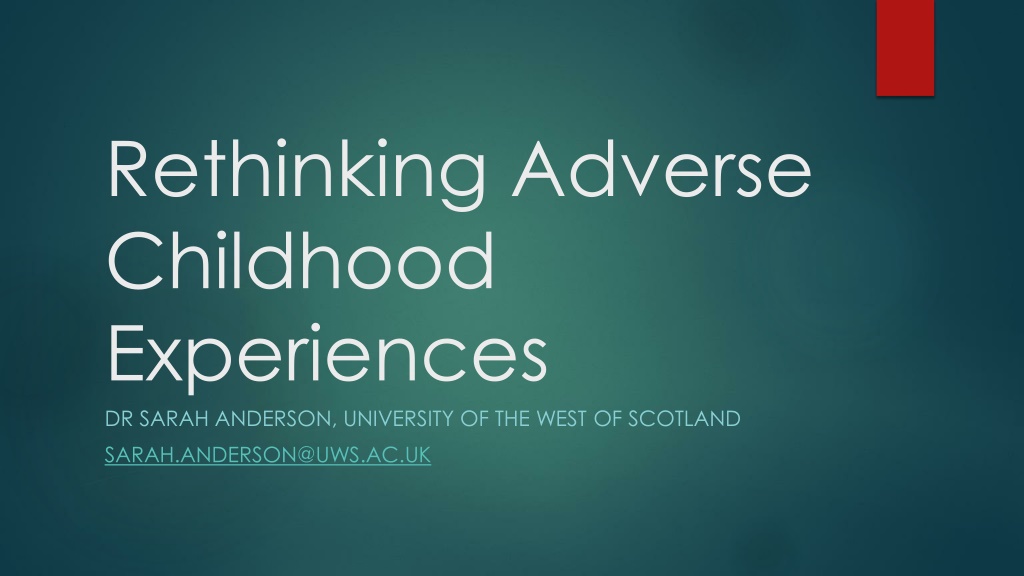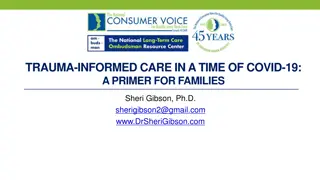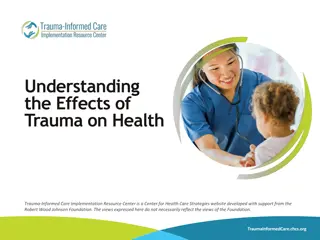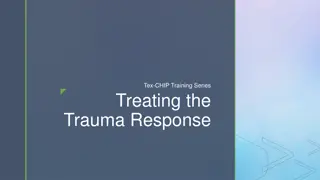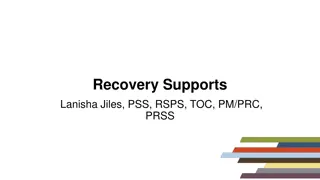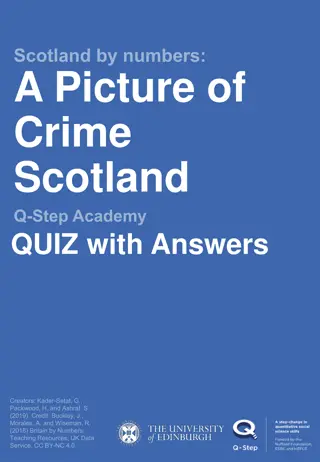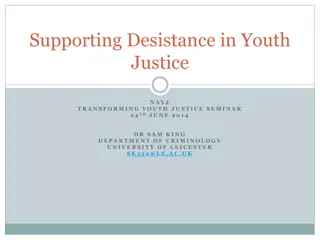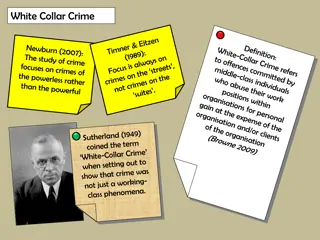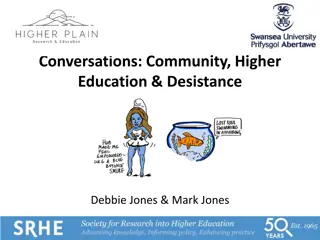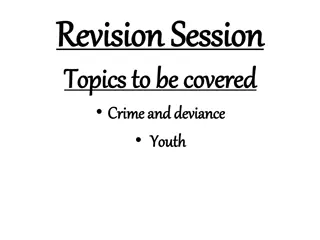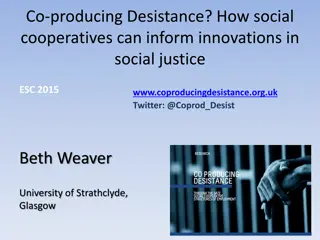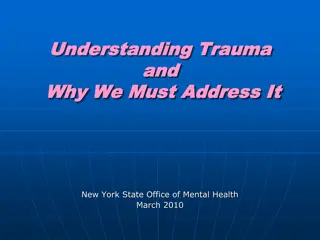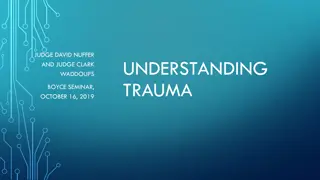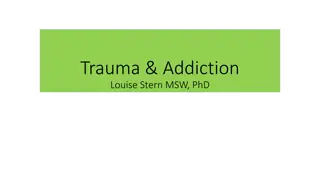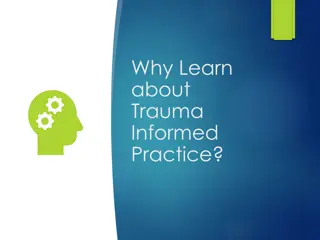Exploring Desistance from Crime and Recovery from Trauma: A Study by Dr. Sarah Anderson
Dr. Sarah Anderson from the University of the West of Scotland conducted a methodology project focusing on the relationship between desistance from crime and recovery from trauma among 16 men in Scotland and England. The study included data collection through group art workshops using collage inquiry and life history interviews, with a focus on understanding positive changes made by participants. The project aimed to challenge the discourse around Adverse Childhood Experiences (ACEs) and highlight the importance of framing social issues in a constructive manner to drive effective solutions.
- Desistance from Crime
- Recovery from Trauma
- Adverse Childhood Experiences
- Positive Changes
- Social Issues
Download Presentation

Please find below an Image/Link to download the presentation.
The content on the website is provided AS IS for your information and personal use only. It may not be sold, licensed, or shared on other websites without obtaining consent from the author. Download presentation by click this link. If you encounter any issues during the download, it is possible that the publisher has removed the file from their server.
E N D
Presentation Transcript
Rethinking Adverse Childhood Experiences DR SARAH ANDERSON, UNIVERSITY OF THE WEST OF SCOTLAND SARAH.ANDERSON@UWS.AC.UK
Methodology Project: Exploring the relationship between desistance from crime and recovery from trauma Sampling: 16 men (11 from Scotland, 5 England) Repeat offending and 2 of: substance use problems, mental health problems, or homelessness Gatekeepers report as having made positive changes in life (particularly around offending) Data collection: Open, unstructured approach Group art workshops using collage as inquiry (Butler-Kisper, 2008) (Scottish sample only) Detailed field notes from collage creation sessions and use of collages to support elicitation of narratives Life history interviews (initial & follow-up after 6 months), using minimalist passive interviewing (Jones, 2003) Data analysis: Pen portraits Drawing on techniques from BNIM (Wengraf 2001), contrasting lived life / told story, & relationship between two Drawing on techniques from Interpretive Phenomenological Analysis (Smith, Flowers & Larkin, 2009)
ACEs: Some questions we should ask Where did ACE discourse come from? What is the evidence base behind it and what are its limitations? How is ACE discourse being used? What is the implicit logic behind the ACE discourse? What s missing from the picture?
Why does it matter? The way we talk about people and social problems frames the way we understand them and the solutions that this gives rise to.
Ollie Ollie grew up in a former industrial area of the west of Scotland. He left school at 16 and hoped to go into a trade, like his older brother, but at the time he finished school, around 1990, there was a recession and the factories in his area had mostly closed down. He found a job in one factory where he hoped to learn a skilled trade, but this factory was destroyed by fire and the business closed: it's all the government [ ] when I left school they shut all the factories down. All the (.) work, know what I mean? (...) Hard to get a job. There's not'ing else you can do. You just hang about. He was unable to find a job, started drinking heavily, taking drugs and committing crime. Over twenty years later and Ollie was trying to turn his life around and had made good progress, but he still struggled to find employment and he appeared depressed. There was simply nae work he told me. He said: The only thing that's missing at the moment is I don't have a job. If I could get a job it would be alright .
Grant Grant grew up in the same small town in the west of Scotland. He had a very difficult relationship with his parents, in particular his mother, who he described as cold and who disciplined him harshly: there was nae talking [ ] you got a skelp [slap or beat] . He was an angry child and left home at 16, becoming homeless, drifting between towns and cities and getting involved in crime. He struggled with his mental health and drank heavily, which he attributed among other things to his estrangement from family. By the time he was in his thirties, he had managed a two year period away from crime, but still struggled with anxiety. He attributed this to ongoing family issues, which were rooted in a lot of stuff in the past .
Which one is the real Grant / Ollie?
Adverse Childhood Experiences domestic violence parental separation or divorce a parent with a mental health condition being the victim of physical abuse by a parent / adult in the household being the victim of sexual abuse being the victim of emotional abuse by a parent / adult in the household being the victim of physical neglect by caregivers being the victim of emotional neglect by caregivers a member of the household being in prison growing up in a household in which there are adults experiencing alcohol and drug use problems. Adapted from Polishing the Diamonds report: Appendix A
The Ecology of Trauma Mary Harvey (1996) on the ecology of trauma : each individual s reaction to violent and traumatic events will be influenced by the combined attributes of those communities to which s/he belongs and from which s/he draws identity (p.5) context matters!
Bulhan (1985) argues that: Structural violence is the most lethal form of violence because it is the least discernible; it causes premature deaths in the largest number of persons; and it presents itself as the natural order of things [ ]. Structural violence pervades the prevailing values, the environment, social relations and individual psyches (p. 155). i ek (2008) Systemic violence is the often catastrophic consequences of the smooth functioning of our economic and political systems (p.1) [ ] the violence inherent in a system: not only direct physical violence, but also the more subtle forms of coercion that sustain relations of domination and exploitation, including the threat of violence (p.8)
ACEs and the criminal justice system Will Linden, Acting Director of the Scottish Violence Reduction Unit: Understanding ACES is fundamental to preventing violence. The weight of evidence in this area speaks for itself. Police officers can be our frontline defence to help protect our young people from ACES. (Police Scotland n.d.)
http://news.bbc.co.uk /1/hi/england/625040 6.stm
Trauma and risk in the criminal justice system Then Leader of the House, Andrea Leadsom MP acknowledged: the very serious issue of the impact of appalling early experiences on young people who then find themselves on the conveyor belt into a life of crime (HC, 28 Jun 2018). Justice Analytic Services, Scottish Government: [The evidence] makes a strong case for preventing crime by targeting those most at riskof experiencing adverse childhoods (JAS, 2018)
Why does it matter? The way other people see and talk about us frames the way we understand and see ourselves.
References Bateson, K. et al. (2019) Understanding the use, and misuse, of Adverse Childhood Experiences (ACEs) in trauma-informed policing, The Police Journal: Theory, Practice and Principles, available online at: https://journals.sagepub.com/doi/pdf/10.1177/0032258X19841409 Bulhan HA. (1985) Frantz Fanon and the Psychology of Oppression, New York: Plenum Press. Couper S. and Mackie P. (2016) 'Polishing the Diamonds' Addressing Adverse Childhood Experiences in Scotland. Glasgow: Scottish Public Health Network Harvey MR. (1996) An ecological view of psychological trauma and trauma recovery. J Trauma Stress 9: 3-23. HC. (28 Jun 2018) vol. 643, col. 1059. Available at: http://bit.ly/2DFVP84 (accessed 24.11.18). Joy, E. and Beddoe, L. (2019) ACEs, Cultural Considerations and Common Sense in Aotearoa New Zealand, Social Policy and Society, 18 (3) pp. 491-497 Justice Analytical Services (2018) Understanding childhood adversity, resilience and crime, available at: https://www.gov.scot/publications/understanding-childhood-adversity-resilience- crime/ (accessed 12.03.19) Kelly-Irving and Delpierre (2019) A Critique of the Adverse Childhood Experiences Framework in Epidemiology and Public Health: Uses and Misuses, Social Policy and Society, 18 (3), pp. 445-456 Police Scotland (n.d.) Trauma-informed Policing, available at: https://www.scotland.police.uk/whats-happening/trauma-informed-policing/ (accessed 12.03.19) i ek S. (2008) Violence, New York: Picador.
